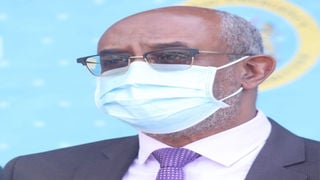
Health CAS Rashid Aman giving the daily Covid-19 update on March 23, 2021.
| Dennis Onsongo | Nation Media GroupNews
Premium
Fear as new virus strains detected in Kenya
What you need to know:
- The UK or Kent variant — also known as B.1.1.7 — has been found to be more transmissible and deadly.
- The South Africa coronavirus strain, also known B.1.351, is less deadly than the original variant, but spreads faster.
Kenya is staring at a Covid-19 disaster after two new and more lethal variants were confirmed, amid soaring infections and lack of preparedness by county governments.
The Ministry of Health on Tuesday confirmed the presence in Kenya of the South African and United Kingdom strains of the virus.
This was a day after the Nation reported that the new variants could be fuelling the spiralling infections and deaths.
The news came as it was confirmed that at least three counties have no functional intensive care units (ICUs) and Covid-19 isolation centres, with most such facilities in “prepared” regions being in bad shape, dysfunctional or lacking staff.
Acting Health Director-General Patrick Amoth said at least 16 cases of the South African Covid-19 variant and three of the UK strain were discovered at Kemri Wellcome Trust, Kilifi, and Kemri Walter Reed Project Clinical Research Centre in Kisumu.
The UK or Kent variant — also known as B.1.1.7 — has been found to be more transmissible and deadly. It has been found in more than 50 countries.
The South Africa coronavirus strain, also known B.1.351, is less deadly than the original variant, but spreads faster. It is now found in at least 20 countries.
Kenya’s South-African-strain cases were through genome sequencing of 55 samples between January 28 and March 5,meaning many more cases could have gone undetected by now, given the country’s limited testing capacity.
UK variant
“Genome sequencing is tedious and expensive. Even the reagents we use are expensive. We got the variants from the few samples tested,” Dr Amoth said as he gave the Covid-19 update in Nairobi yesterday.
The 16 cases, he added, were mostly detected from samples collected near the Tanzanian border and in people with a history of travelling to the neighbouring country.
“We’re going to begin the genome sequencing in our Nairobi samples to find out if the variants are active in the community,” Dr Amoth said.
The first cases of the UK variant were detected among British soldiers who jetted into the country and went to Nanyuki, Laikipia county, early this year.
The government assured Kenyans that it had contained the spread of the strain. It is suspected that the new coronavirus strains are spreading in communities.
Although the government gave devolved governments millions of shillings to prepare for the coronavirus battle, the Nation has established that Homa Bay, Tana River and Busia counties don’t have functional isolation beds and ICUs.
“The three are the only ones I can point at, but most of them shut the units when the country was almost flattening the curve,” a Ministry of Health official, who requested anonymity, told the Nation yesterday.
“It’s a conversation we should start having, given the direction the virus is taking.”
Bed statistics
Only 43 counties have submitted their bed statistics to the Council of Governors. The total is 493 ICU and 10,698 isolation beds.
“There is the submission and working bits. Most of them are not operational. Governors need to do something as quickly as possible,” the ministry bureaucrat said.
During a crisis meeting by governors yesterday, it emerged that there are no staff at the county ICUs since the contracts of those hired by the government expired.
The government recruited at least 1,000 health workers to help in the fight against coronavirus during the first and second waves.
“There is the urgency of the isolation centres reopening, but who will work there? Will they continue working with expired contracts? The government should either extend the contracts or employ new workers,” the source said.
It has also emerged that many county hospitals don’t have a regular supply of oxygen in their emergency departments even as the number of patients continues to grow.
For the last five days, the number of people in need of oxygen and ventilators has been doubling daily, posing a crisis in counties without stable supplies.
As of yesterday, some 120 severely ill Covid-19 patients were admitted to various ICUs, while 1,013 were in the wards.
Surging numbers
Counties seem to be loosening up amid rising infections and deaths, with Nairobi already in a bed crisis.
Every ICU bed at Kenyatta National and Mbagathi hospitals are full, forcing patients to look for space at private institutions, which are also getting overwhelmed.
“It’s bad. All hospitals in Nairobi now have waiting list for ICU and Covid-19 isolation beds with oxygen. Please mask up. Take care of yourselves,” Dr Ahmed Kalebi, chief consultant pathologist, Lancet Group of Laboratories, said.
Last week, Health Cabinet Secretary Mutahi Kagwe asked governors to equip hospitals in readiness for the surging coronavirus numbers. The country’s health system is stretched, he added.
Mr Kagwe told the Senate Health Committee that critically ill patients are being transferred to the city for treatment, yet the counties were given money.
Yesterday, Health Chief Administrative Secretary Rashid Aman said Kenyans should expect a rise in numbers as the third wave is in its early stages.
He said the third wave had come with more cases, admissions to hospital, “and even deaths. Our hospitals are overwhelmed.
“Let’s go back to the basics,” Mr Amama said.






